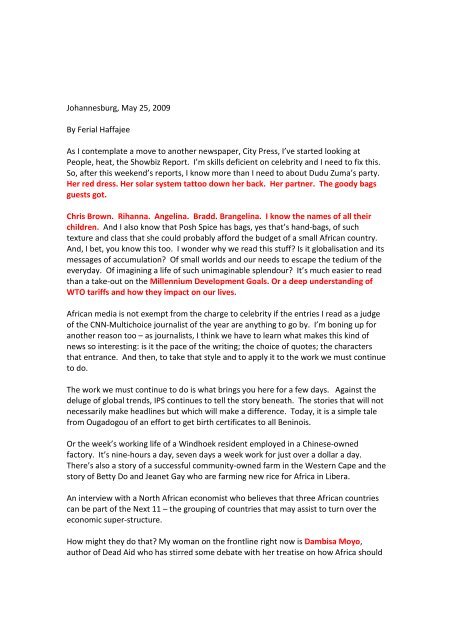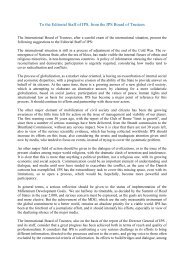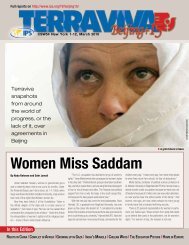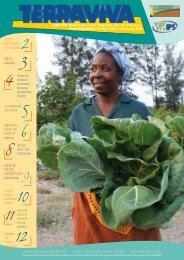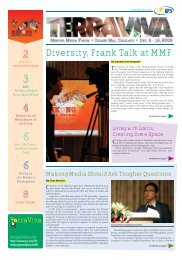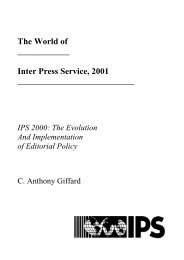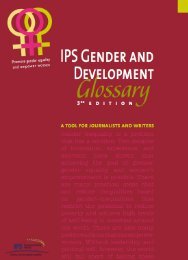Ferial Haffajee's speech - IPS Inter Press Service
Ferial Haffajee's speech - IPS Inter Press Service
Ferial Haffajee's speech - IPS Inter Press Service
You also want an ePaper? Increase the reach of your titles
YUMPU automatically turns print PDFs into web optimized ePapers that Google loves.
Johannesburg, May 25, 2009<br />
By <strong>Ferial</strong> Haffajee<br />
As I contemplate a move to another newspaper, City <strong>Press</strong>, I’ve started looking at<br />
People, heat, the Showbiz Report. I’m skills deficient on celebrity and I need to fix this.<br />
So, after this weekend’s reports, I know more than I need to about Dudu Zuma’s party.<br />
Her red dress. Her solar system tattoo down her back. Her partner. The goody bags<br />
guests got.<br />
Chris Brown. Rihanna. Angelina. Bradd. Brangelina. I know the names of all their<br />
children. And I also know that Posh Spice has bags, yes that’s hand-bags, of such<br />
texture and class that she could probably afford the budget of a small African country.<br />
And, I bet, you know this too. I wonder why we read this stuff Is it globalisation and its<br />
messages of accumulation Of small worlds and our needs to escape the tedium of the<br />
everyday. Of imagining a life of such unimaginable splendour It’s much easier to read<br />
than a take-out on the Millennium Development Goals. Or a deep understanding of<br />
WTO tariffs and how they impact on our lives.<br />
African media is not exempt from the charge to celebrity if the entries I read as a judge<br />
of the CNN-Multichoice journalist of the year are anything to go by. I’m boning up for<br />
another reason too – as journalists, I think we have to learn what makes this kind of<br />
news so interesting: is it the pace of the writing; the choice of quotes; the characters<br />
that entrance. And then, to take that style and to apply it to the work we must continue<br />
to do.<br />
The work we must continue to do is what brings you here for a few days. Against the<br />
deluge of global trends, <strong>IPS</strong> continues to tell the story beneath. The stories that will not<br />
necessarily make headlines but which will make a difference. Today, it is a simple tale<br />
from Ougadogou of an effort to get birth certificates to all Beninois.<br />
Or the week’s working life of a Windhoek resident employed in a Chinese-owned<br />
factory. It’s nine-hours a day, seven days a week work for just over a dollar a day.<br />
There’s also a story of a successful community-owned farm in the Western Cape and the<br />
story of Betty Do and Jeanet Gay who are farming new rice for Africa in Libera.<br />
An interview with a North African economist who believes that three African countries<br />
can be part of the Next 11 – the grouping of countries that may assist to turn over the<br />
economic super-structure.<br />
How might they do that My woman on the frontline right now is Dambisa Moyo,<br />
author of Dead Aid who has stirred some debate with her treatise on how Africa should
e weaned of structural aid. One trillion dollars later, the continent has little to show<br />
for years of disbursements. She argues that our future lies elsewhere:<br />
• bond markets<br />
• bourses<br />
• making it easier for remittances to be paid<br />
• microfinance<br />
• title deeds to turn property into equity<br />
I’d add a few more:<br />
• to encourage the growth of a generation of entrepreneurs<br />
• while putting the power back into the public sphere<br />
• to leverage Chinese and Indian investment into Africa to our best advantage –<br />
don’t take an ideological position against it but ensure that the terms of this 21 st<br />
century trade work for development<br />
While African growth rates seem set to trend downwards, it does seem that we may<br />
escape the worst of the global recession, though it is already impacting on the rate of<br />
remittances being received.<br />
I certainly hope so as we are also witness to the birth of a new generation of African<br />
businesses and entrepreneurs. And women are benefiting. I’ve met women who own<br />
radio stations, mines and manufacturing companies. Who could, with some steam,<br />
begin to turn around our post-colonial fortunes.<br />
Another woman leader who is showing us a beacon is Ellen Johnson-Sirleaf. Turning<br />
around a broken country is not an easy task but with her focus on leveraging investment<br />
and on encouraging safety and truth, she has helped to change the face of African<br />
leadership. It is no longer a continent of big men: instead, two of the world’s leaders in<br />
women’s representation in public office are now on our continent.<br />
South Africa and Rwanda, together with Cuba and Sweden now make up the four<br />
countries nearing equity in the rates of representation of men and women. Presently,<br />
we in South Africa are engaged in a huge debate on whether it is the numbers or the<br />
gender or the impact that counts. In leadership, symbolism is crucial and leadership<br />
collectives and must reflect the diversity of the people they represent. But once that is<br />
achieved or is even on the path to being achieved, impact counts too.<br />
Impact. Efficiency. Accountability. These are concepts we journalists must deal with if<br />
we are to assist the path of Africa’s growth and development. Too often, we are more<br />
comfortable dabbling with numbers, entitlement and power and the trappings of power<br />
than studying its outcome.
Yesterday, I attended a big cricket match and as our bus pulled up near the stadium,<br />
sirens screeched us to a near halt. A police car in front. A BMW X5. Another one.<br />
Another fancier one bearing the numberplate RSA1. Four more black cars, all with blue<br />
lights. Our new president, Jacob Zuma, travels in an eight-car long convoy. I’m sure it’s<br />
bigger than Obama’s. Why What possible danger does he face He lives around the<br />
corner from the stadium. It was a Sunday afternoon.<br />
Our leaders, men and women, are still too obsessed with the trappings of power rather<br />
than the impacts of the power they hold. Is public money spent efficiently How good<br />
are public services How easy is to effect accountability Judging the CNN awards, I<br />
was struck by how these issues are beginning to exercise the minds of our journalists.<br />
Across pages and columns and spreads, journalists investigated the state of schools and<br />
hospitals.<br />
Several made the apposite point that while we pay our leaders to provide good public<br />
services, these are generally of such a shambolic state that leaders like Nigeria’s Umaru<br />
Yar-Adua goes to Saudi for medical attention while another president commandeered a<br />
state aircraft to get his daughter to Paris to have her baby.<br />
We have to place the pride and dignity back into African public service because<br />
beyond a small elite, these services will have to deliver the millennium development<br />
goals: that basic set of indicators of decency and well-being. These are not going to be<br />
delivered by NGO’s or aid but off our own fiscus’s and by our own public services.<br />
In my work, I sometimes get to do things I may not otherwise. So, the other week I<br />
went along to a function that awarded top beauty products. A lady there told me that<br />
when the economy’s rough, red lipstick sales go up! People need to feel powerful, so<br />
red lipstick provides the boost. Similarly, sales of chocolate are solid; dvd rentals are<br />
buoyant and so are cupacinno sales.<br />
And this may explain why celebrity is so enduring a read, through good times and bad.<br />
It’s journalism’s red lipstick. Earlier this month, Ban Ki Moon, yes the man himself<br />
turned up to an <strong>IPS</strong> cheese and wine function. <strong>IPS</strong> functions always attract the best<br />
development thinkers who know that its core message endures.<br />
I’ve known a celebrity or two to stray across the website, but at its core is the belief that<br />
good journalism about development in all facets can make the world a better place. It<br />
can keep power on its toes and help to maintain the dream of a fair and equal world.<br />
Your story of a female Palestinian judge speaking about attempts to provide better legal<br />
services for women for whom honour killings are still so awfully everyday will stay with<br />
me.
And so will an interview with the Zimbabwean author Valerie Twagira who speaks,<br />
frankly, about the everyday quality of the violence she encountered as a doctor in public<br />
service.<br />
Your gender-wire is like an alternative hot-wire in an era where women are still often<br />
only depicted as the sum of their body-parts. We are so much more and you know this.


